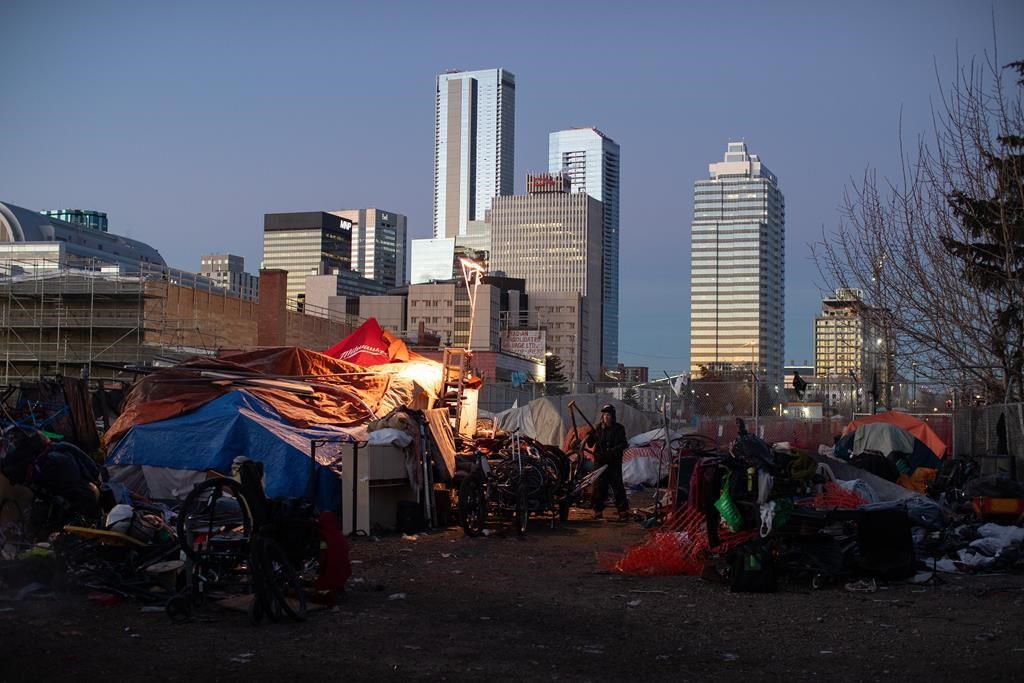ST. JOHN’S, N.L. — Unhoused people have a fundamental right to live in encampments, and that right is violated when authorities tear them down, Canada’s housing advocate says.
In a piercing report released Tuesday, Marie-Josée Houle says the expansion of homeless encampments across the country is a national human rights crisis that requires immediate action and co-ordination involving all levels of government.
The report calls on governments to take responsibility for deep systemic failures that violate the right to housing, which Canada officially recognized in 2019. And it says they need to ensure homeless people have permanent housing as soon as possible.
“Encampments represent an effort by people who are unhoused to claim their human rights and meet their most basic needs,” says Houle’s report. “Canada has the capacity to solve this crisis. What is lacking is sufficient political will, resources and coordination.”
In an interview ahead of the report’s release, she called for an immediate end to forced evictions of homeless encampments, offering a blunt message to cities, including Halifax and Edmonton, that are trying to dismantle them: “These are human rights violations. This approach will only endanger lives.”
Houle was appointed to monitor Canada’s progress upholding housing as a human right. Her report, called “Upholding dignity and human rights,” caps off a review that began in February 2023, and involved meetings with advocates, Indigenous leaders and people living in encampments across the country.
Since then, the issue has only become more urgent, she said.
In Halifax last week, the municipality issued eviction notices to people living in five of its 11 designated encampments, telling people they had to leave by Feb. 26. Last month in Edmonton, police tore down a camp deemed by the city to be “high risk,” and arrested three people, including a journalist.
Unhoused people in Alberta, Saskatchewan, Nova Scotia and New Brunswick have also died in camps, some from overdoses and tent fires. There are safety risks in tent cities, Houle said, but dismantling them pushes people further into the margins, where they’re more vulnerable.
In the absence of affordable, accessible housing, encampments can also provide community, security and consistency — qualities unhoused people often say are lacking in emergency shelters and other temporary housing options, Houle said.
Nobody living in camps should be forced to use shelters or other options that don’t meet their needs, she said. “A lot of people experiencing homelessness have very bad trauma related to social services, related to institutions, related to people in uniform.”
“If there is going to be building trust for people to use resources, then forcing people and criminalizing them is never going to make that work.”
Houle’s report calls on the federal government to establish a national encampments response plan by Aug. 31 that would fulfil the report’s calls to action.
Cities should provide encampments with electricity, bathrooms, clean water, heat and other basic amenities, the review said.
Provinces and territories must offer health care, including harm reduction and mental-health services, as well as access to a safe supply of drugs for those who use them, it said. They must also increase welfare or income support, as well as minimum wages, and adopt legislation recognizing housing as a human right.
The federal government should work with the Canadian Mortgage and Housing Corporation to make federal funding for cities and provinces tied to a commitment to upholding the human right to housing, according to Houle’s report.
Above all, Houle said, governments should inform their decisions about unhoused people after speaking with them and finding out what they need.
“It is a question of life and death for a lot of people,” she said.
This report by The Canadian Press was first published Feb. 13, 2024.
Sarah Smellie, The Canadian Press








